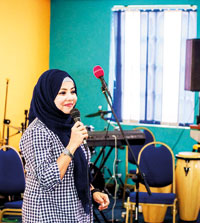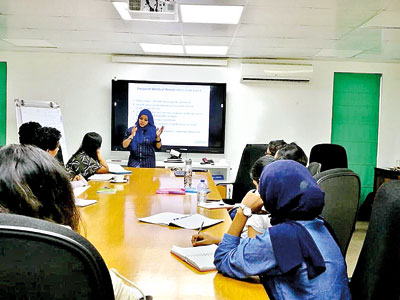Arts
Need someone to talk to? You can reach out online
Her Instagram page, (@emotionalwellbeingwithardaly) though only a few months old, is slowly gaining traction among Sri Lankan youth, and even older people, because of her informative and creative means of spreading awareness on a sensitive topic.
”I believe that social media platforms are a great space to create awareness on mental health as it is now a space for everyone, regardless of age. It’s a space that can create change and help many people,” says Ardlay Mohamed.

Ardlay conducting a workshop for students on social media addiction organised by the Non Addict Movement of Royal College
Ardlay Mohamed is the Counsellor and Asst. Centre Manager at Shanthi Maargam and has been with the organisation since its inception four years ago. She completed a Diploma in Counselling Psychology at Metropolitan College in Dehiwala and her Higher National Diploma in Counselling at the Sri Lanka Foundation Institute and is also certified as a Psychological First Aid trainer.
Shanthi Maargam, a registered non-governmental organisation seeks to reduce violence in communities by healing the emotional traumas of vulnerable adolescents and youth offering counselling for those in need.
Ardlay has also worked as a counsellor at Emerge Global Lanka and trained counsellors at Indira Cancer Trust. She has also worked with The Ohana Project, and has been invited by many other organisations and schools to facilitate workshops and training programmes. In webinars locally and internationally, Ardlay has participated in live chats on Facebook to create awareness about mental health issues.
“The archaic belief that you must be crazy or mentally ill to talk to a therapist is still present, unfortunately. I have people who reach out for help but cannot share this with their friends or family for fear of being judged or criticised. If we can take our physical health seriously then we need to start giving the same importance to our mental health as well; this will create balance and help us feel better.”
“I started my Instagram page after one of my best friends pushed me to do it. Many people have reached out for help, through the page. Others have thanked me for the information I’ve shared and reached out for live chats.”
She urges those someone struggling with mental health issues to reach out. “It’s OK not to feel good all the time, and it’s OK to reach out and talk to someone; a friend, family, colleague or even a counsellor. Take your mental health seriously, don’t disregard it. If you feel you need help to manage your life and what you are going through, please reach out.”
Asked what one can do to help a family member or close friend struggling mentally, she says, “Listen, and be there for them. Don’t judge them or disregard what they are going through. It’s not difficult to help someone in need. Give them the space to open up. If you feel they need further help, refer them to a professional.”
Explaining the difference between counselling and psychotherapy, Ardlay says: “Counselling generally refers to short-term consultation while psychotherapy typically refers to longer-term treatment. Counselling typically deals with present issues that are easily resolved on the conscious level, whereas psychotherapy intensively and extensively examines a person’s psychological history.”
“In Sri Lanka counsellors too, work on a long term basis with clients like I do. A psychologist on the other hand, will have the professional training and clinical skills to help people learn to cope more effectively with life issues and mental health problems.”

Ardlay addressing a training programme in psychological first aid at the WHO premises
“Due to the current COVID-19 situation and people being confined to their homes, awareness and help through social media has played a vital role in helping people locally and internationally,” she added.
Of course such awareness needs to come through accurate information.
“Don’t turn yourself into an overnight therapist thinking that you can do it without the proper education and skills. Be responsible when you share information,” she advises.
Ardlay firmly believes that mental health issues should become a normal part of everyday life for mental health support systems to improve.
“Sri Lanka needs more awareness in schools, homes and offices, and we need a committee to regulate people who provide therapy. Unfortunately since there isn’t a proper regulatory board many under qualified people also start practising and this creates more harm than good,” she says.

